
Redesigning health and well-being for all
Canadian researchers share how they are redesigning health and technology solutions to improve health care

Canadian researchers share how they are redesigning health and technology solutions to improve health care
By Angelica Marie Sanchez University RelationsThe University of Waterloo welcomed Royal Society of Canada (RSC) academics from across Canada, as they participated in a full-day symposium on Health and Well-being for All by 2030: Application of technology to global health problems, held at Federation Hall on November 16.
The RSC and Waterloo share a common goal of addressing local and global challenges through future-focused solutions that have real-world impact. So, it was fitting that Waterloo hosted this year’s RSC Celebration of Excellence and Engagement conference (#COEE2023) to discuss the future of health.
“Waterloo has long been known as a leader in technology and innovation. In areas such as health, we have an important opportunity to shape technology to serve society, rather than letting technology shape us,” said Vivek Goel, president and vice-chancellor, during his opening remarks at the symposium. “The complexity of the challenges we are facing within health care requires diverse and inter-disciplinary solutions.”
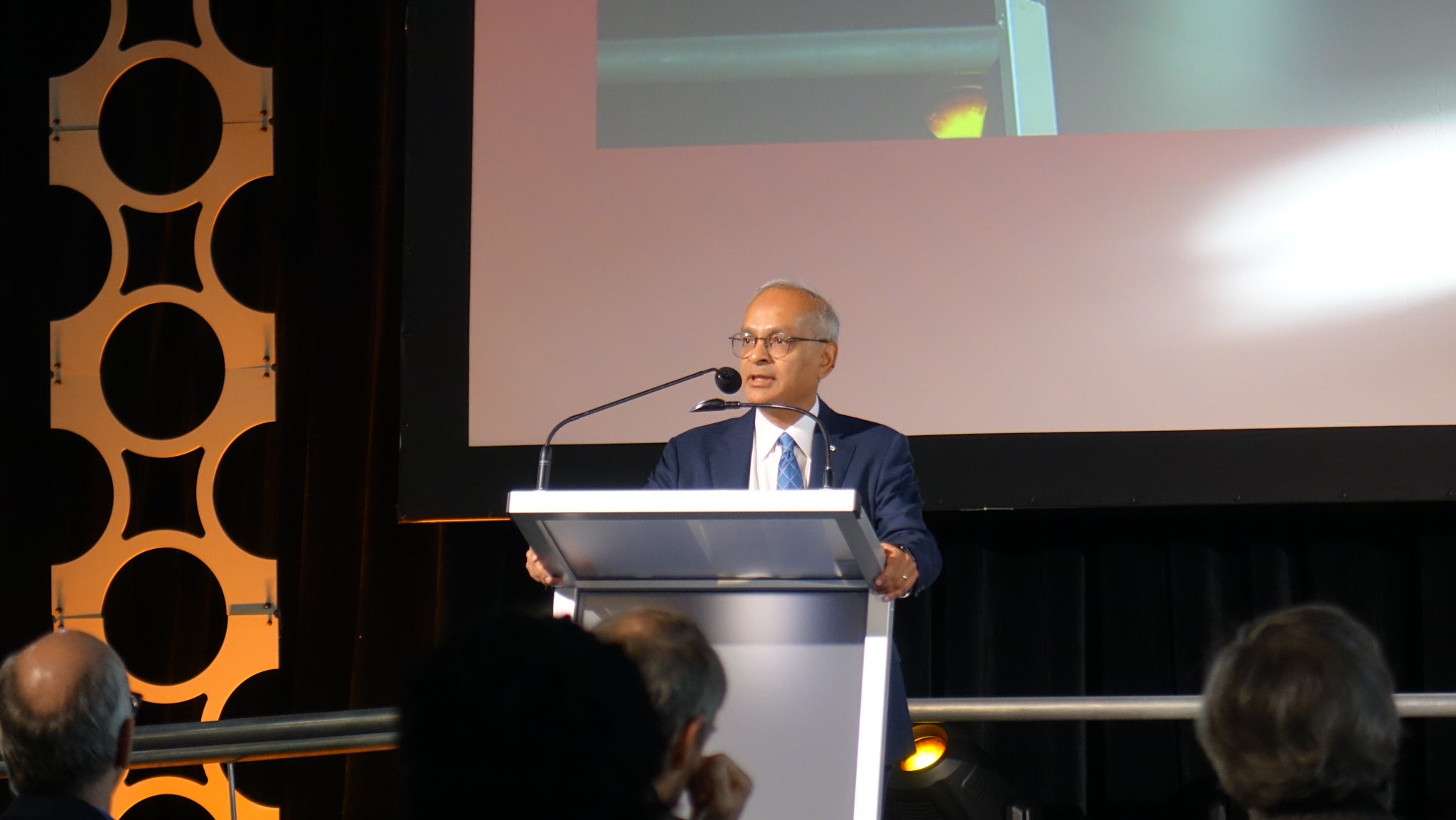
Vivek Goel, president and vice-chancellor at the University of Waterloo, giving the opening remarks at the full-day symposium on Health and Well-being for All by 2030: Application of technology to global health problems.
Attendees were asked to start their day with an open mind, as they took part in a series of speakers and panel discussions, ranging from robotic-mediated rehabilitation and health technologies to the ways we can improve innovation and health equity for all.
In her keynote, Stephanie Nolen, a New York Times health reporter, highlighted the importance of developing health and technology solutions for real-world impact to support the ongoing HIV-AIDS crisis in Africa.
Nolen’s book, 28 Stories of AIDs in Africa, used a humanistic approach where she brought life and a name onto every story she has ever documented. It not only evoked others to listen and understand the ongoing health issues that people are experiencing in rural regions, but also prompted Nolen to call upon all levels of government globally, to take action and support those in marginalized communities.
“Without the hard work of building systems that are robust and are equitable, then there is a really limited amount of impact that innovation can have,” Nolen said.
Nolen’s keynote set the tone for the full-day symposium, as she left the audience to consider how can they implement social inclusion strategies into their research, where solving global health problems should always include marginalized communities in rural areas.
The first panel of speakers were moderated by Stan Woo, director of the School of Optometry and Vision Science at Waterloo, as the panel discussed their individual research on the developments of robots for social and physical rehabilitation.
Kerstin Dautenhahn, a Waterloo professor and Canada 150 Research Chair in Intelligent Robotics, started the discussion with her research on improving human-robotic interaction. Specifically, on the development of social and companion robots that have been designed for real-world applications to support the mental health and well-being of children, teenagers and young adults with disabilities.
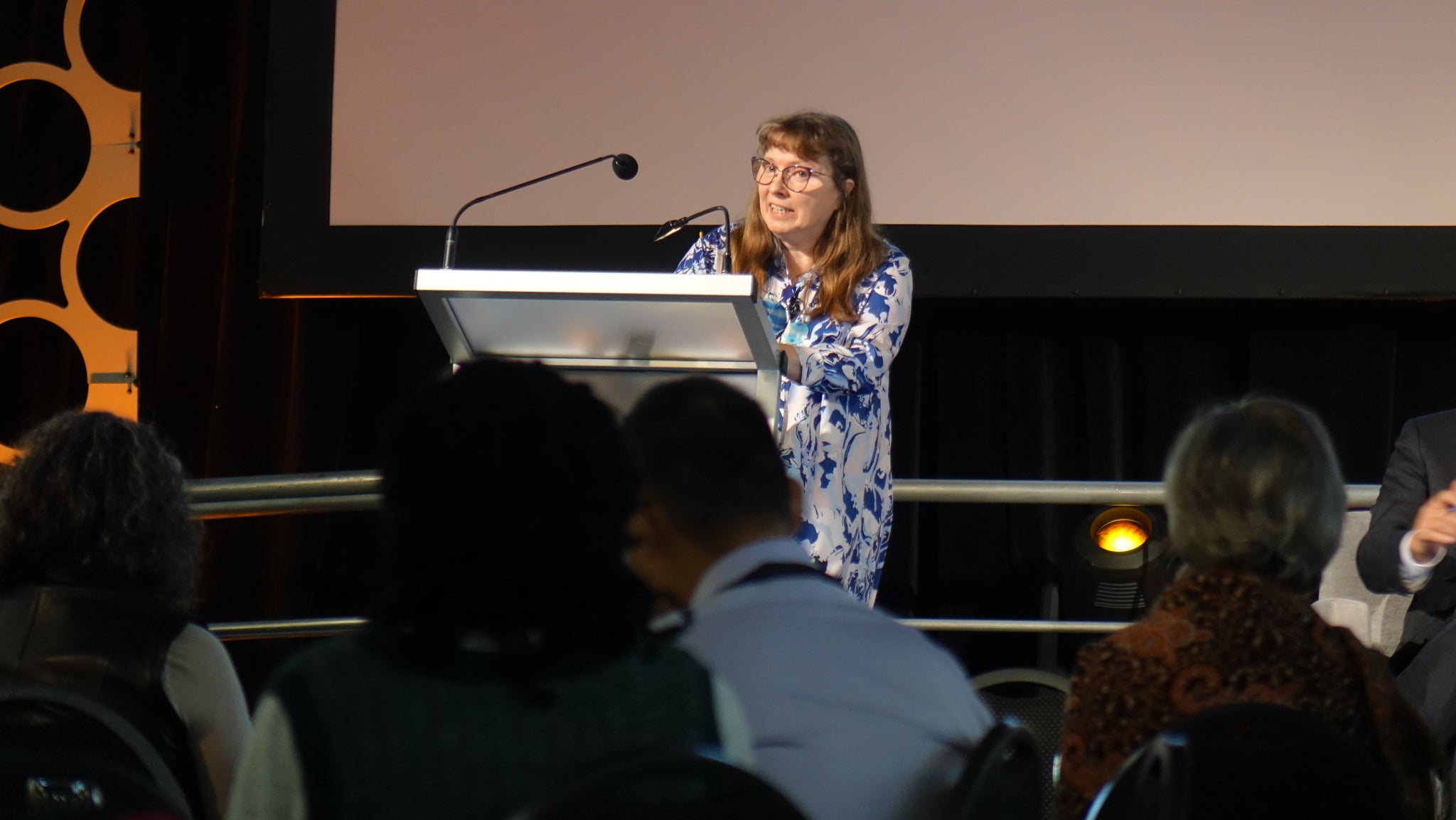
Kerstin Dautenhahn, Waterloo professor and Canada 150 Research Chair in Intelligent Robotics, sharing her research on the development of social and companion robots that have been designed for real-world applications.
“Social robots are designed to interact and communicate both verbally and non-verbally, are able to dictate questions, body moments and gestures, and much more,” added Dautenhahn, who also joined the 2023 cohort of RSC fellows.
“I always emphasize that it’s not about replacing experts such as doctors, nurses, teachers, therapists or instructors. It’s about developing tools that can make their jobs easier and not interrupt any current interventions, such as by adding to existing technology, complement existing approaches to therapy, and engage with clients to motivate their patients.”
While Michelle Johnson, a professor of Physical Medicine and Rehabilitation at Pennsylvania University, shared how her research in robotic-mediated rehabilitation supports patients with aging, neural diseases and neural injury. Through the success of her research at Pennsylvania University, Johnson and her team were able to deploy their robots in Botswana, South Africa, as a therapeutic strategy for community health workers and caregivers to work with their patients.
The Canadian researcher mentioned how a colleague of hers had raised an important question, “how can we make these robots more practical and affordable?”
Johnson answered how conferences are important avenues for researchers like herself to be able to forge strong connections, and potentially reach organizations that could provide financial support in the development of more affordable therapy and social robots. Not only does Johnson’s research help examine barriers to address global health challenges, but her research also affirmed how robotics can make for a pragmatic solution for low and middle-class countries — specifically for HIV-AIDS and stroke patients — to have access to physical therapy.
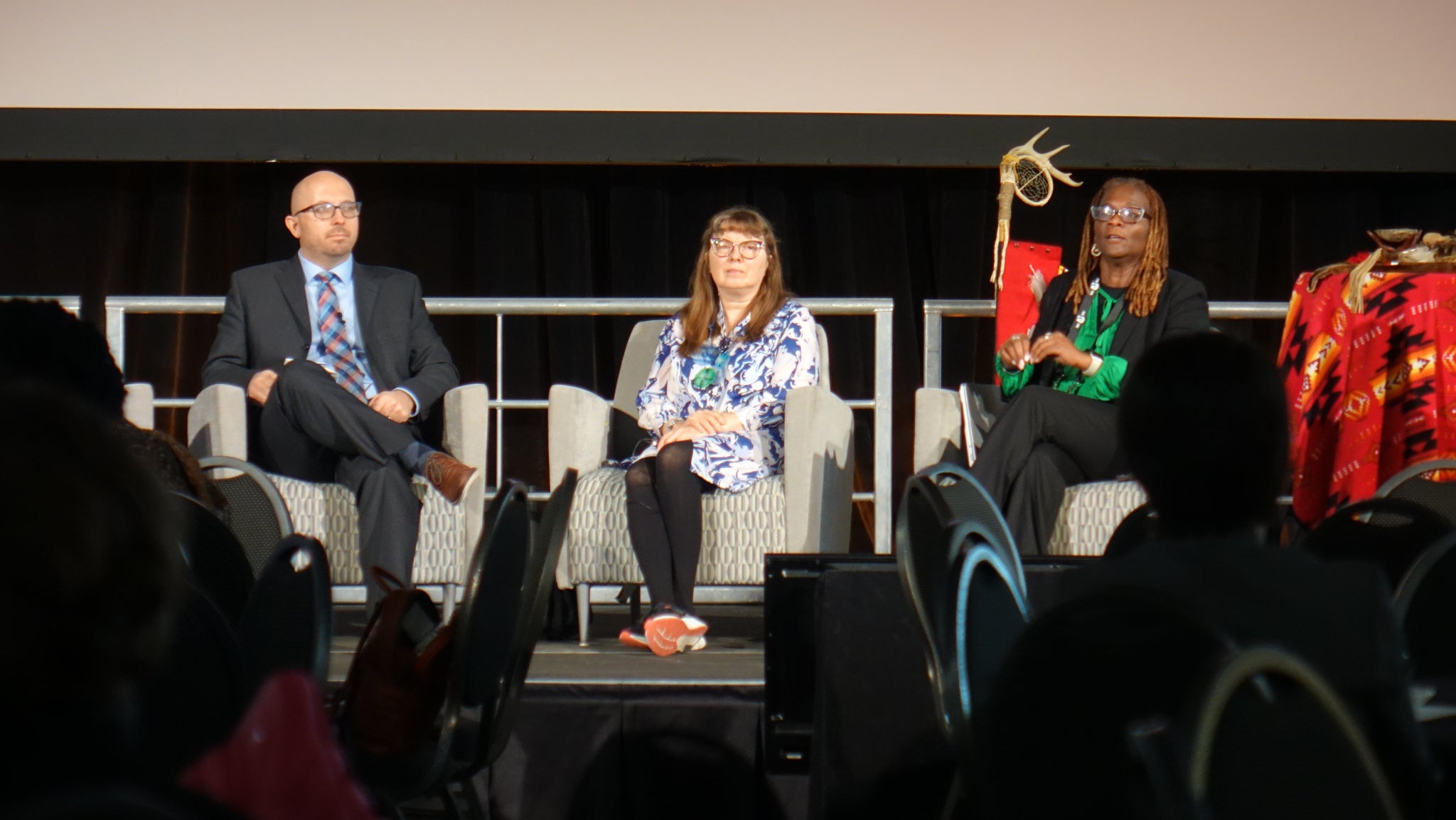
The first panel discussion was moderated by Stan Woo (not pictured) and featured Canadian researchers David Savage, Kerstin Dautehahn and Michelle Johnson.
Johnson and Dautenhahn’s research are two examples of how robotics developed as assistive technologies have the potential to fill the shortage of clinicians in marginalized communities, while improving multi-generational health care for all.
“Social robots cannot solve global problems that you have heard about,” Dautenhahn explained. “But as an emerging technology, robots have the potential to make an impact in education … and when it comes to physical health, you need robots that are able to deliver such a specific type of assistance and can address societal challenges for underserved communities.”
The second panel discussion was centred around Canadian researchers and their medical innovations that are currently in the market. Alfred Yu, a Waterloo professor in electrical and computer engineering, presented his research on nanotechnology for biomedical ultrasound applications as an improvement for point-of-care diagnostics.
Guy Faulkner, a professor at the University of British Columbia, discussed data results from wearable devices and how it showed a significant decline of the physical health and well-being of people during the COVID-19 lockdown. The third panellist, Jeffrey Karp, a Canadian researcher and professor of Medicine at Brigham and Women’s Hospital, Harvard Medical School, showcased his medical innovation virtually on the advancement of biomaterials — made from the secretion of sandcastle worms — used in minimally invasive procedures.
“I think most of the technologies developed in academia haven't made it to patients, and one of the major reasons is because they have to be scalable,” Karp explained. “We have to engage people in the entrepreneurial ecosystem and address how can we scale the materials and be sustainable for a year or two, before thinking about the entire trajectory of our project.”
Yu, Faulkner and Karp are hopeful that their technological approach for improving the health and well-being of all can be scaled up, by having their medical research reach markets that include entrepreneurs and the financial industry.
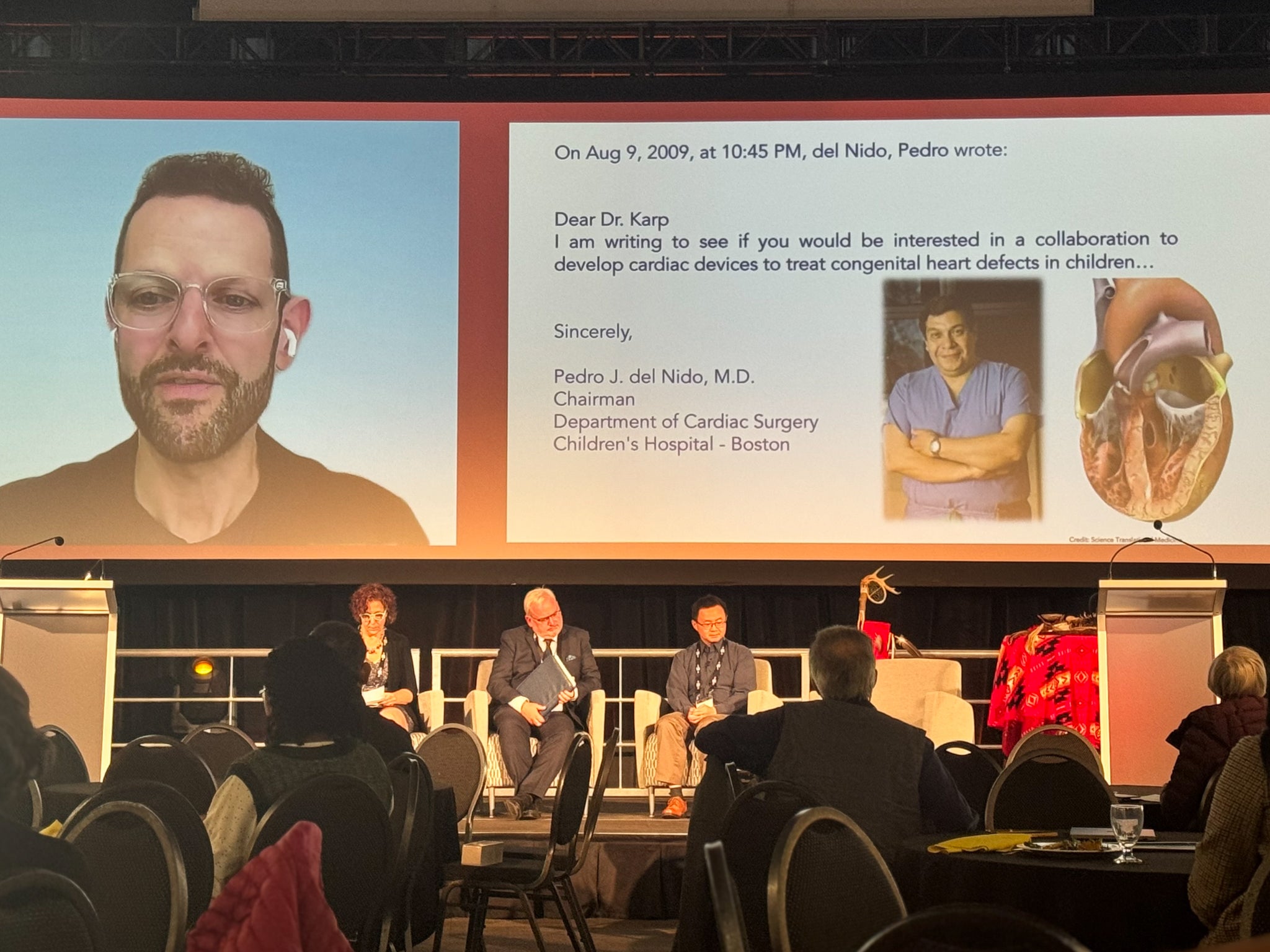
The second panel discussion was moderated by Marina Mourtzakis (centre left) and featured Canadian researchers Guy Faulkner, Alfred Yu and Jeffrey Karp (virtual screen).
Other discussions during the symposium focused on the best practices and policy for personalized interventions, and ethical and community-based approaches to care.
David Savage, a Northern Ontario School of Medicine University professor and an emergency physician in the Thunder Bay region, expressed his concerns about patients living in northern and southern Ontario who do not have adequate access to trauma-level emergencies. While Heather Keller, a Waterloo professor in the Department of Kinesiology and Health Sciences, provided insight on the importance of improving the health and quality of life of older adults living in long-term care homes through food and nutrition.
Savage and Keller’s research sparked audience questions on how many Indigenous communities are impacted by the lack of resources in rural regions across Canada. Many discussions throughout the full-day symposium tied into the theme of how addressing local challenges can lead to solving global challenges through future-focused solutions.
Elder Myeengun Henry, Indigenous Knowledge Keeper at Waterloo, provided the closing remarks by presenting an Eagle Staff and a Wampum belt to the audience, as a reminder to the original agreements between First Nations and the Canadian government in the 18th century.
“Thank you for coming to the University and for speaking about these ideas,” Elder Henry said. “We can now watch these young minds take those ideas to help change the policies that once neglected Indigenous perspectives. That's what we tried to do today by building this knowledge base together to hopefully see change in the future.”
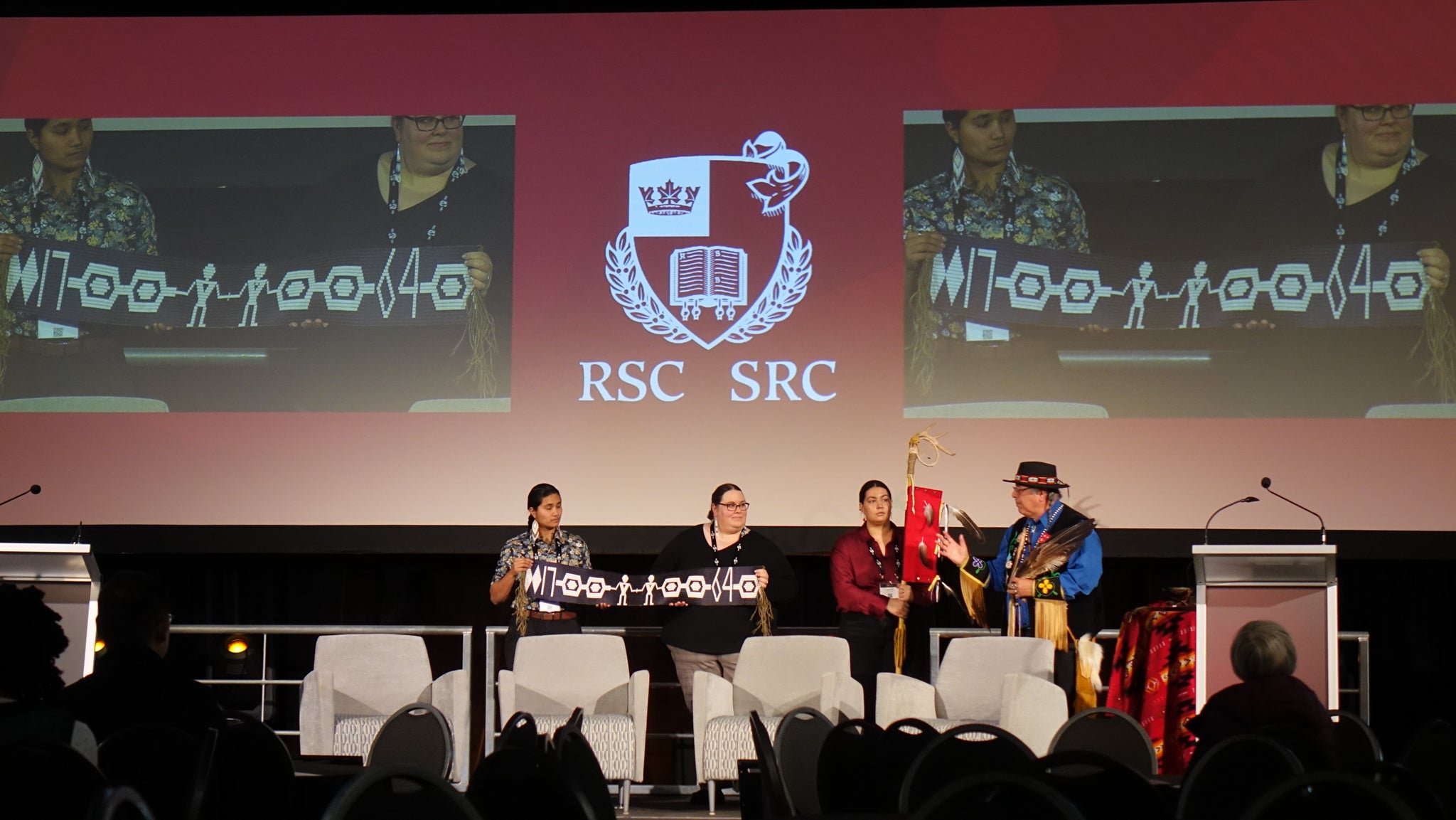
Elder Myeengun Henry, Indigenous Knowledge Keeper at Waterloo, provided the closing remarks by presenting an Eagle Staff and a Wampum belt to the audience, as a reminder to the original agreements between First Nations and the Canadian Government in the 18th century.
This year, among the 200 researchers from across Canada, nine Waterloo researchers were appointed as fellows and members of the RSC College, including Dautenhahn, whose research are working to solve global health problems of our time.
Waterloo researchers will continue to work with industry and community partners to support their interdisciplinary research, as part of their commitment to transforming societies, economies, technologies, sustainability and health, for humanity to thrive in our complex future.

Read more
The University of Waterloo presents #COEE2023 from November 15 to 18

Read more
The Royal Society of Canada welcomes new fellows and members to the 2023 class of the RSC College

Read more
Dr. Anita Layton receives John L. Synge Award for outstanding research in mathematical sciences
The University of Waterloo acknowledges that much of our work takes place on the traditional territory of the Neutral, Anishinaabeg, and Haudenosaunee peoples. Our main campus is situated on the Haldimand Tract, the land granted to the Six Nations that includes six miles on each side of the Grand River. Our active work toward reconciliation takes place across our campuses through research, learning, teaching, and community building, and is co-ordinated within the Office of Indigenous Relations.